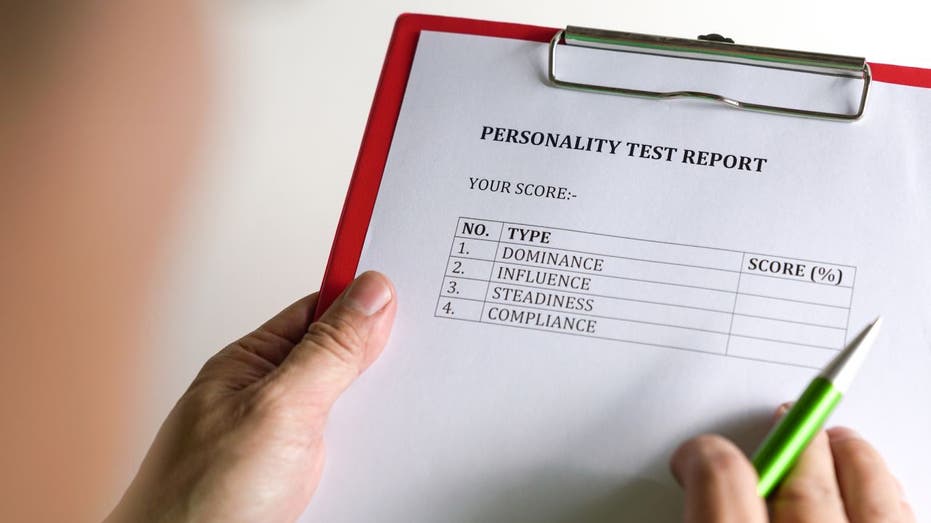Should you write a cover letter? Experts weigh in
Are cover letters outdated or essential? The answer isn’t a simple one
US labor secretary on 'good' March jobs report
Labor Secretary Marty Walsh ackowledges there is 'work to do' on the jobs front, but argues overall the March employment report was 'strong.'
If you’re on the prowl for a new job, you may have come across your fair share of cover letter requests.
The supplementary document has helped hiring managers make decisions about candidates for decades, but some job seekers are questioning whether it’s worth it to write and edit tailored letters for each company they apply to when there’s no promise that they’re being read, or if they’ll get a customary response from human resources.
10 SIGNS YOU SHOULD PROBABLY QUIT YOUR JOB
So, what should job seekers do if they’re on the cover letter fence? The answer isn’t simple, but career experts generally look at cover letters favorably whether they read them or not.

Hiring managers have used cover letters as a screener for job candidates for decades. (iStock)
"I talk to recruiters and HR professionals on a regular basis, and they fall into the following three camps," said Dawid Wiacek, personal brand strategist at Career Fixer, in response to FOX Business’ inquiry.
- "Those who never read cover letters because a resume and/or LinkedIn profile should be sufficient."
- "Those who occasionally glance at a cover letter since it sometimes provides additional clarity or fills in gaps or questions or concerns raised by the resume."
- "Those who almost always read a cover letter for many reasons, including that it helps them get a sense of the personality and style of the candidate, or maybe the job requires strong writing and overall communications skills."
On the plus side, Wiacek thinks cover letters don’t need to be lengthy or overly formal, unless a candidate is applying to "an old-school formal company or institution" like a "law firm, legacy pharmaceutical company or investment bank."
"A human being wants to be engaged in the first sentence—so tell your human reader why you resonate with their company or brand."
In his professional opinion, though, most people can get away with writing a simple paragraph about why they’re interested in the role and why they’d be a good fit.

Recruiting software is often used to sort through job candidates. (iStock)
While technology has evolved to help companies develop hundreds of applicant tracking systems (ATS), each is designed to operate differently, Wiacek said. Some systems might scan cover letters for "keywords and phrases that appear in the job description," but others won’t even bother.
27% OF REMOTE PANDEMIC HIRES DON’T FEEL EMBRACED BY THEIR TEAM
"A human being wants to be engaged in the first sentence—so tell your human reader why you resonate with their company or brand," Wiacek suggested. "Maybe you use their product, or you admire their CEO, etc. Find a personal point of resonance and make it clear."
Wiacek notes that certain industries will place more weight on other parts of a job application than a cover letter, which could include online portfolios or work samples.
"Networking can also help you land interviews if your cover letters or writing skills overall are weak."
Some job candidates could benefit from hiring a resume writer, but this avenue is usually best for competitive roles with high pay or potentially someone who’s not a native English speaker, according to Wiacek.
"Networking can also help you land interviews if your cover letters or writing skills overall are weak," Wiacek said. "[But,] any time you are writing something, whether it's a resume, a cover letter, a LinkedIn bio, etc.—you want to make sure you're putting your best foot forward. People will judge you for the clarity, the impact, the power of your written communications skills—or the lack thereof."
Are cover letters outdated?

Cover letters are a supplemental document job candidates submit with their formal applications. It's often paired with a resume. (iStock)
Even though most employers still see value in cover letters in job applications, there are some hiring managers who favor other screening methods in today’s job market.
"For most roles, cover letters are an outdated and unnecessary step in the hiring process," said Candace Nicolls, senior vice president of people and workplace at Snagajob. "If creative or persuasive writing is a key component of the job, cover letters can be a great way to demonstrate that particular skill. Otherwise, there's an increasingly growing school of thought that cover letters are often unnecessary, and worse: often unread."
PART-TIME RETIREMENT JOBS THAT PAY $15 PER HOUR OR MORE
"Candidates are better off spending their time building robust profiles on sites aligned to the work they’re seeking, or structuring their resumes to be truly reflective of what they’ve accomplished."
She went on to note that most job candidates recycle cover letters for multiple job openings, so it’s unlikely for employers to get "distinctive" letters.
"Candidates are better off spending their time building robust profiles on sites aligned to the work they’re seeking, or structuring their resumes to be truly reflective of what they’ve accomplished," Nicolls continued. "Both will relay their experience more effectively than a cover letter."
What cover letter alternatives are employers using?
James Rice, head of SEO at Picked – an AI talent assessment company, told FOX Business that some "perfectly qualified" job candidates have been written off for small mistakes in their cover letters, which could include spelling errors or a wrong employer address or title.
"For junior roles, in particular, employers care more about your technical and soft skills and less about your experience."
"Nowadays, the cover letter is being replaced by competency-based application questions and pre-employment tests," Rice said. "Both resumes and cover letters are becoming less useful. For junior roles, in particular, employers care more about your technical and soft skills and less about your experience."

Personality tests and other assessments are becoming more common in job candidate screenings. (iStock)
Some employers are requiring or are encouraging job candidates to upload videos where they can describe or highlight their skills. Though, this unconventional method is often seen in creative tech fields.
"Using video to highlight your skillset is one of my favorite methods," said Lamar Nava, director of customer success at Betts Recruiting. "We discovered that candidates who uploaded a video received twice as much company engagement."
MAJORITY OF US WORKERS WANT TO STAY REMOTE: SURVEY
"We’ve seen candidates who were rejected after final rounds send over creative videos to explain why they were the best person for the job. And it works," Nava continued. "Candidates have successfully been able to change the hiring manager's decision from a rejection to an offer letter."

Some industries are incorporating optional or mandatory video submissions in job applications. (iStock)
Employers are consulting hybrid social media job board sites like LinkedIn when making hiring decisions, said Will Hobson, PR director at Rise at Seven – an SEO-focused content marketing firm.
"Having a well-written LinkedIn profile can act as a stand-in for a resume and cover letter."
"Having a well-written LinkedIn profile can act as a stand-in for a resume and cover letter [by] establishing the candidate as credible and trustworthy," Hobson told FOX Business. "This acts as more of a validator than a traditional application, as there are plenty of tools to sell yourself including recommendations, certifications, and images that can be used to show why you are the perfect person for an opportunity."
Are cover letters essential?

Cover letters can usually be uploaded or pasted into online job applications. (iStock)
Despite the rise of automation in recruitment software, there are still humans in human resources and a lot of them are in favor of cover letters.
"I continue to find cover letters to be an effective tool for the candidate to express themselves and their enthusiasm for the position," said David Ciccarelli, CEO at Voices – an audio-focused recruitment marketplace.
"Cover letters are the standard."
"The cover letter also provides the hiring manager a range chance to evaluate the candidate's writing skills," Ciccarelli told FOX Business. "This is important given how much of modern-day business communication is done via email, documents and presentations."
GET FOX BUSINESS ON THE GO BY CLICKING HERE

Despite the rise of automation in recruitment software, there are still humans in human resources, and a lot of them view cover letters favorably. (iStock)
He went on to note that "cover letters are the standard" the same way resumes are at professional workplaces.
"Even if the candidate was personally referred by a member of the executive team, they should state this in their cover letter," Ciccarelli said.
What are the benefits of writing a cover letter?
Submitting a cover letter with your application is "in the candidate’s best interest," even if an employer says it’s optional, according to Eleesha Martin, recruitment process outsourcing manager at G&A Partners – a payroll and full-service HR company.
"Cover letters are also viewed favorably because they can be interpreted as the candidate having a higher level of interest in the role or company."
"If the recruiter or hiring manager is trying to find ways to weed out candidates, it’s a strong possibility that candidates may get tossed aside if they didn’t submit a cover letter regardless of their relevant experience," Martin said. "Cover letters are also viewed favorably because they can be interpreted as the candidate having a higher level of interest in the role or company."

Cover letters help hiring managers determine your formal writing ability. (iStock)
James Philip, founder of Employment BOOST, told FOX Business that cover letters help job candidates who are making significant changes in their careers.
"There are three core reasons why someone would use a cover letter," Philip said.
- "First, when you’re returning to the workforce."
- "Second, if you are relocating."
- "Third, if you’re applying for a job that’s outside your normal background."
Philip added, "Beyond that pay attention to what the description says on the job posting to make sure you're including important information, like education or skills, to ensure that you are not automatically screened out."
CLICK HERE TO READ MORE ON FOX BUSINESS

In competitive industries, submitting a cover letters might help you get to the interview phase. (iStock)
With cover letters being optional and some job seekers outright refusing to write one for their application, there’s a competitive edge that exists.
"If a recruiter or hiring manager is deciding between two candidates, they may use the cover letter to help them decide."
"A good cover letter may still make a difference in whether or not you get hired," said Dave Rietsema, founder and CEO at Matchr.com, an HR software company. "If a recruiter or hiring manager is deciding between two candidates, they may use the cover letter to help them decide."
"On top of that, not submitting a cover letter may be a big enough red flag that a hiring manager might think you’re not committed to the job and may not consider your resume," he continued. "Plus, a cover letter is a great place to stand out."




















